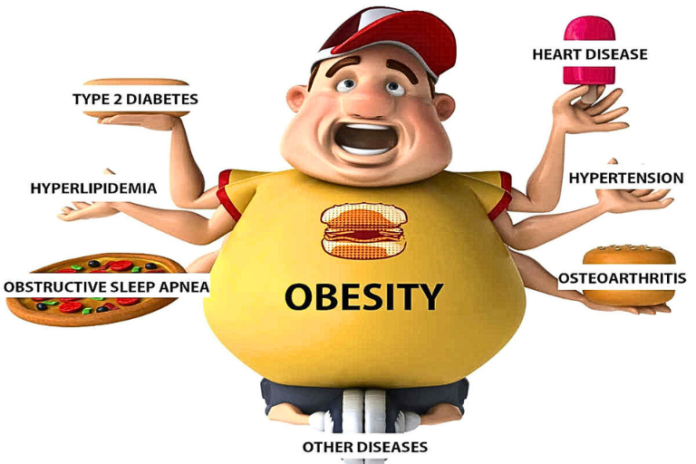Introduction
Obesity has become a global health concern, affecting millions of people worldwide. It is more than just a cosmetic issue; it is a medical condition that increases the risk of various diseases, including diabetes, heart disease, and hypertension. Despite numerous awareness campaigns, the prevalence of obesity continues to rise due to unhealthy lifestyle choices, genetic factors, and environmental influences. This blog explores the causes, demerits, and possible solutions to obesity, offering valuable insights for those who seek to prevent or reverse it.

Causes of Obesity
Obesity is a complex condition with multiple contributing factors. Some of the most common causes include:
1. Poor Diet and Overeating
A primary cause of obesity is excessive calorie intake, often due to a diet rich in processed foods, sugars, and unhealthy fats. Junk food, sugary beverages, and fast food contribute significantly to weight gain.
2. Sedentary Lifestyle
Physical inactivity is another major contributor to obesity. With advancements in technology, people now engage in fewer physical activities. Long hours spent on computers, watching television, or playing video games have replaced outdoor activities and exercise.
3. Genetic Factors
Genetics also play a crucial role in obesity. If a person has a family history of obesity, they are more likely to gain weight due to inherited traits affecting metabolism and fat storage.
4. Psychological Factors
Emotional eating, stress, anxiety, and depression can lead to overeating, further increasing the risk of obesity. Many individuals consume unhealthy foods as a coping mechanism for negative emotions.
5. Medical Conditions and Medications
Certain medical conditions, such as hypothyroidism, polycystic ovary syndrome (PCOS), and Cushing’s syndrome, can cause weight gain. Additionally, some medications, including antidepressants, steroids, and beta-blockers, may lead to obesity as a side effect.
6. Environmental and Socioeconomic Factors
Living in an environment where healthy foods are expensive or inaccessible can increase obesity risk. Fast food is often more affordable and convenient than fresh, nutritious meals, making it difficult for lower-income individuals to maintain a healthy weight.
Demerits of Obesity
Obesity negatively affects both physical and mental well-being. Some of the major disadvantages include:
1. Increased Risk of Chronic Diseases
Obesity is a leading cause of many chronic health conditions, including:
Diabetes: Excess weight leads to insulin resistance, increasing the risk of type 2 diabetes.
Cardiovascular Diseases: High cholesterol levels, hypertension, and heart disease are common in obese individuals.
Stroke: Obesity-related conditions like high blood pressure elevate stroke risk.
Cancer: Studies suggest that obesity increases the risk of certain cancers, including breast, colon, and pancreatic cancer.
2. Reduced Mobility and Physical Discomfort
Obesity puts extra pressure on the joints and muscles, making movement difficult. This can lead to osteoarthritis, back pain, and decreased physical fitness.
3. Mental Health Issues
Obesity is linked to depression, low self-esteem, and anxiety. Societal stigma and body image concerns often result in emotional distress, further impacting mental health.
4. Shorter Life Expectancy
Studies indicate that obesity reduces life expectancy by increasing the risk of severe health complications. The more severe the obesity, the greater the impact on longevity.
5. Social and Economic Consequences
Obesity can affect an individual’s social and professional life. Discrimination in the workplace, limited career opportunities, and higher healthcare costs make obesity a significant burden.
How to Cure Obesity
While obesity is a serious condition, it is preventable and reversible with the right approach. Here are some effective strategies to combat obesity:
1. Healthy Eating Habits
Balanced Diet: Consume a diet rich in whole grains, lean proteins, fruits, and vegetables.
Portion Control: Be mindful of portion sizes to avoid overeating.
Reduce Sugar and Processed Foods: Minimize the intake of sugary drinks, fast food, and unhealthy snacks.
Stay Hydrated: Drinking enough water helps control appetite and improve metabolism.
2. Regular Exercise
Cardio Workouts: Activities like running, cycling, swimming, and brisk walking aid in fat loss.
Strength Training: Weightlifting and resistance exercises help build muscle and improve metabolism.
Consistency: Exercise should be a daily routine, even if it’s just a 30-minute walk.
3. Behavioral and Lifestyle Changes
Sleep Well: Poor sleep is linked to weight gain; aim for 7-9 hours of quality sleep per night.
Manage Stress: Engage in relaxation techniques like meditation, yoga, or deep breathing to prevent stress-induced overeating.
Avoid Emotional Eating: Recognize triggers and opt for healthier coping mechanisms.
4. Medical Interventions
Consult a Doctor: If lifestyle changes don’t work, a healthcare provider can recommend treatments such as weight-loss medications or bariatric surgery.
Nutritional Counseling: A dietitian can create a personalized meal plan to achieve weight-loss goals.
5. Community Support and Awareness
Support Groups: Joining weight-loss programs or groups can provide motivation and accountability.
Educational Initiatives: Awareness campaigns about healthy lifestyles can help prevent obesity at the community level.
Conclusion
Obesity is a significant health challenge that requires urgent attention. By understanding its causes and consequences, individuals can take proactive steps to manage their weight effectively. A combination of healthy eating, regular exercise, behavioral changes, and medical interventions can help in the fight against obesity. With determination and the right support system, achieving and maintaining a healthy weight is possible for everyone.

